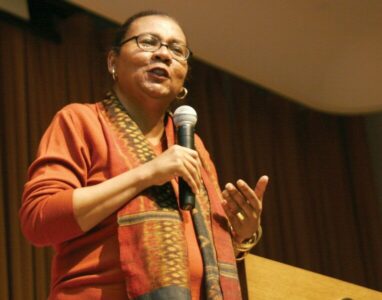Originally posted at exmormon.reddit.com.
Much of the faithful bloggernacle is currently talking about Dr. Grant Hardy’sUnderstanding the Book of Mormon, published by Oxford Press. I was intrigued by the premise when it first came out a few months ago, but have been quite reticent about posting anything about it to /r/exmormon due to both the subject matter as well as the faithful status of the author. However, why the hell shouldn’t it post anything? Few people here know me and Reddit karma is a nonexistent item. If I lose it, then so what? In that case, full speed ahead!
This is, in my own humble opinion, one of the most significant books to be written about the Book of Mormon by a believing member since B. H. Roberts first wrote his honest (and damaging) critique in the early 1900s. Yet the significance lies less in questions of historicity and more in questions of authorial intent. This is not a book that is meant to shore up the faithful (in fact there are some clear statement within it that you’ll never find a FAIR apologist making: there is zero archeological evidence for the Book of Mormon, the presence of Deutero-Isaiah in Nephi is an unexplainable anachronism, and the book reads suspiciously like a religious book meant for 1830s New England), but neither is it meant to be a book encouraging a skeptical approach to New World origins for the Book of Mormon.
The book’s main premise is actually one of avoiding the issue of historicity entirely. For those who are interested at this idea, be aware: Hardy routinely attempts to remain unbiased and neutral on issues of historicity but also routinely fails. Reading the text it can be hard to see the dividing line between treating people simply as characters within a narrative and treating them as characters of history. With that understood, Hardy wants to encourage the reader to go through the Book of Mormon as a narrative only. Whether the reader approaches it as fiction or non-fiction, Hardy feels that there’s more than enough for the Book of Mormon to be studied from a purely literary perspective.
And here’s the surprising thing: it pays off big time.
To help illustrate the process for those who are suspicious, let’s turn it towards a different fictional book set in a specific historical milieu:Hamlet.The equivalent book aboutHamletwould be far less interested with Shakespeare’s errors in Danish history (though those are important for the full context), but would instead ask “What can we learn from the text about Hamlet as an individual?” For instance, we know that Hamlet went to school with Rosencrantz and Guildenstern: what was his education like? What did he focus on? What was he good at? What was he poor at? Anyone who’d be writing such a book would know that the historical Hamlet bears little to no relation to Shakespeare’s Hamlet (and probably never went to school), but the object of study is the Hamlet that emerges from the prose of the play.
In a similar vein, Hardy wants to explore the Book of Mormon from the point of view of its three narrators only: Nephi, Mormon, and Moroni. Whether or not Joseph Smith (or Sidney Rigdon) is standing behind these characters, the text itself claims to be narrated by them, so what does the text itself say about them?
Hardy makes an entertaining argument that the text says alotabout them.
It says that Nephi can be a vain, harsh, often unforgiving person who often only cares that people are listening to what he has to say. If it’s not important to his message, he doesn’t care to discuss it (such as providing any meaningful justification for the behavior of his brothers, leaving them as two-dimensional cardboard cutouts). Contrasted with what the narrative seems to reveals about Lehi, who seems to be concerned with people like Laman and Lemuel, Nephi seems to have given up on everyone who doesn’t agree with him. As such, history, or fairness to the portrayal of anyone, is very much secondary to Nephi’s purpose in writing his text.
The narrator of Mormon is a character whoisconcerned with history instead of simply giving a point; and yet Mormon is also firmly in control of how that history is presented. He’s not one to shy away from a naturalistic portrayal of history, but only after he’s first discussed something more miraculous. When discussing the destruction of Ammonihah, he first presents the story as a divine judgement upon the city. However, he later presents the same episode, but from the point of view of the Lamanites where we discover the perfectly ordinary reasons that the city is sacked. Mormon wants to impress his “pride cycle” view upon history, but by the time he arrives to his own time period, he recognizes that his simplistic “righteous people get blessed, wicked people get punished” doesn’t apply to his own society and never mentions it again.
Moroni doesn’t care about narrating much of anything, but rather seems much more content in quoting other people’s literature. Hardy makes a rather compelling argument that the Jaredite narrative within the Moroni material is actually anythingbutChristian.
Many of the faithful will, of course, want to use Hardy’s conclusions about the text to support historicity by trying to buttress the difficulty involved in composition by Joseph Smith. But I doubt that anyone’s really denied that the Book of Mormon would be a difficult enterprise to pull off. But anyone who wants to use Hardy’s book in an attempt to shore up the faithful believers in Joseph Smith’s translation has completely missed the point of the work, as have those who would reject the importance of this book merely because the author holds beliefs about his subject matter that don’t agree with their own.
Besides, the book does a delightful thing: it says that the Mormons, who would claim to know the text the best, don’t understand the narrative that much at all. Hardy makes a subtle argument that Mormons read themselves as 21st Century Latter-day Saints into the text so much that they obscure much of what the text itself seems to say. Those who think they should understand best what they have seem to understand it least.
If you’re looking for a fun and interesting read, I reallywouldrecommendUnderstanding the Book of Mormon.I understand if there’s some (perhaps most) who would disagree that this book is worth your time, but this is the Internet: feel free to hash it out below.


“Hardy makes a subtle argument that Mormons read themselves as 21st Century Latter-day Saints into the text so much that they obscure much of what the text itself seems to say.”
I have for the last two or three years worked on a paper about the Book of Mormon that I had intended to present at Sunstone this year. I ended up not going at all, for the first time in probably ten years. I maintain, as you say Hardy does, that Mormons don’t read the BofM, they read into it. They overlay it with a current Church structure, and somehow extrapolate current Church doctrine from it. In fact there is virtually nothing in the Book of Mormon that resembles present day LDS governance or doctrine. I suggest that the content of the Book of Mormon is quite unimportant to the Church–what is important is its origin story, which is used as a certification that Joseph Smith was a prophet. And from that there is a long string of “if this, then that.” In fact, I even think that if the Church did not have the Book of Mormon, and an anthropologist discovered gold plates that contained what we now call the BofM, the Church would see them as only an interesting curiosity, but nothing that would add doctrinal or spiritual insights, and certainly nothing about Jesus that isn’t already known from the New Testament. I think they would say, “A witness, we already have a witness, why do we need another witness of Christ?”
I should be careful in what I say. I didn’t mean that Hardy ever comes right out and says as much to the reader, but nonetheless that is very much an underlying thread through his book. He discusses approaches that modern LDS have taken in regards to such things as modern Republican politics in comparison to the reign of the judges and the Gadianton robbers. There are many other examples where he feels the narrative does not actually run parallel to such comparisons and that the text, when viewed within its own context, yields markedly different views. But I don’t recall him ever coming right out and saying that LDS misread the BoM on the whole; that’s more of an inescapable conclusion towards his demolition of popular LDS conceptions of various BoM stories.
re 1:
parker,
While I believe this is a slightly different focus than how Hardy approaches, I do think that you are right as well. I mean, that’s one of the clearest things that came out to me when I was reading the BoM all the way through the last time…it certainly didn’t feel like reading the OT or NT…it felt like reading the story of Protestants. (Problem: Protestantism didn’t exist.) It doesn’t even really feel like the NT (because the NT really *feels* as if doctrine is being worked out and worked out…it doesn’t feel like a completely finished religion right out of the box.)
I think this was strategic. This way, anyone reading the BoM in 18xx would read it and say, “This is stuff that I already agree with; maybe this is another testament of Jesus Christ.”
And when you buy that, then the chain that you referred to becomes plausible. “I’m feeling really good about what this book is teaching (read: because it’s what I already believe from my protestant church), so I feel really good that this book is inspired, so I feel really good that Joseph Smith is inspired, so I will subscribe to his newsletter.”
What I find interesting about all the articles I’ve read about Hardy’s book (because I haven’t been able to get it yet…my kindle broke and I’m getting a replacement, grrr) is how it fleshes out the characters. When I read the NT, I got the sense that whatever else, it was about real people. But when I read the BoM, the characters seemed too 2-dimensional…but from what I’ve read about Hardy’s book, it seems that he points out that some of the two-dimensionality is “whitewashing” by the narrators (so “Nephi” tells his story slanted in specific ways, ditto for the other redactors.)
A lot of people get that impression. They alluded to it in kind of a funny way in The Book of Mormon‘s “All American Prophet”:
Here’s what the Bloggernacle is saying about the book:
Grant Hardys Subject Problem
An Unsettling Book
Bootstrapping a Book of Mormon Readership
The Deep Subjects of the Book of Mormon, Plato, Zhuangzi, and So On . . .
Grant Hardy and Personal Scripture Study